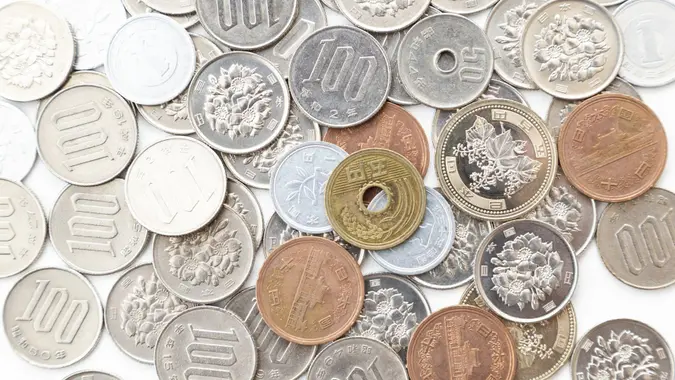If You Own Any of These 12 Japanese Coins, They Could Earn You up to $1.9M

Commitment to Our Readers
GOBankingRates' editorial team is committed to bringing you unbiased reviews and information. We use data-driven methodologies to evaluate financial products and services - our reviews and ratings are not influenced by advertisers. You can read more about our editorial guidelines and our products and services review methodology.

20 Years
Helping You Live Richer

Reviewed
by Experts

Trusted by
Millions of Readers
If you’re a coin collector or are interested in becoming one, you can find some fascinating choices by expanding your search to Japan. Japanese coins are known for their distinctive designs and craftsmanship — which is why many are valued at six figures or higher.
Japan learned about coinage from China and issued its first bronze coins around 708 AD, according to Brittanica Money. Through the mid-10th century, Japan issued a dozen different coins, but that stopped for the next 600 years as Japan moved toward grain and cloth for currency.
Early in the 17th century, however, Japan returned to coinage by issuing the copper kwan-ei. Since then, Japan has issued a variety of gold, silver, copper and nickel coins.
Here are 12 Japanese coins or coin sets with values that rise to nearly $2 million, according to the CoinValueLookup website. All dollar amounts are based on actual sale prices and comments are from CoinValueLookup. Note that many of these examples are graded MS 60 (mint state) or higher.
1. Sado Koban Gold Shield: $75,000
The Koban was used in the Edo feudal period in Japan. This specimen was made from gold mined on the island of Sado, making it one of the “most desirable” types of Koban for collectors.
2. Meireki Oban Gold Shield Keicho Era (1658-95): $84,000
This Oban formed part of the Pinnacle Collection sold in Hong Kong in 2021. It was estimated at between $20,000 and $30,000 but sold for much more than that.
3. Oban Gold Shield Keicho Era (1601-95): $102,000
More than 16,500 Obans of this kind were minted, but the only one graded MS62 sold at auction in 2021 for much more than the expected price of $35,000 to $50,000.
4. 2 Yen, Year 13 (1880): $114,000
This 2 Yen was minted during year 13 of the reign of Emperor Meiji — a year in which “relatively few” coins were minted, boosting its value.
5. Oban Tensho Era (1573-1609): $156,000
Like other Obans, this specimen is covered in hammer marks. But in this case the marks are arranged in columns rather than the “random positioning” found on examples from the era, which increases its value.
6. Oban Gold Shield Genroku Era (1695-1704): $264,000
This was offered at a 2021 auction and came in around the midpoint of its expected sale price of $200,000 to $300,000.
7. Oban Gold Shield Genroku Era (1695-1704): $288,000
This Oban is decorated with shallow, thin lines crossing the coin, which are “quite different” from the deep, thick lines on most Obans.
8. Naga Oban Gold Shield Tensho Era (1573-1591): $348,000
This Oban was predicted to fetch between $200,000 and $300,000 at auction but ended up selling for much higher.
9. 20 Yen Gold Shield, Year 10 (1877): $840,000
“Very few” of these coins were made, leading some experts to speculate that they were produced for presentation to high-ranking officials or foreign dignitaries, leading to the coin’s “exceptional quality.”
10. Gold 10 Yen Pattern Gold Shield, Year 3 (1870): $660,000
This coin features a “very rare pattern” and is “beautifully engraved” with a dragon on one side and a sun and wreath on the other.
11. 1870 Japan Pattern Coin Set: $1.56 million
This set of eight coins were produced during a period when the ingot style coins of the feudal period were replaced by round coins of a “uniform size.” They were minted in London but the designs were “Japanese to the core.”
12. Hishi Oban Gold Shield Tensho Era (1588): $1.92 million
This is one of the first Oban coins ever minted and today only six known are in existence. The pre-sale estimate was $700,000 to 900,000 but the actual sales price was more than double that.
 Written by
Written by  Edited by
Edited by 

























